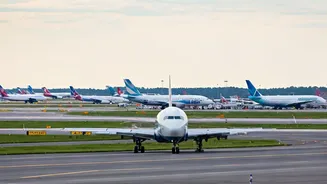Shutdown's Air Impact
The ongoing government shutdown has begun to affect the smooth operation of air travel. Flight cuts were ordered at several major airports across the United
States. This situation highlights how essential governmental functions, such as air traffic control, can be affected by budget impasses and political disagreements. These disruptions caused airlines to react promptly. Consequently, airlines were compelled to modify their flight schedules. The ripple effects of these adjustments likely impacted passengers, causing delays and potentially affecting travel plans, which is a considerable concern for all those involved.
ATC's Key Role
Air Traffic Control (ATC) plays a vital role in the efficient operation of airports. The system is responsible for overseeing and managing all aircraft movements. The ongoing government shutdown has put a strain on this vital service. Reduced staffing and other challenges might have led to an increased workload, which can affect its operational efficiency. Any disruption in ATC capabilities has a direct impact on flights, which can lead to delays, diversions, or cancellations. These outcomes affect travelers and the broader aviation sector.
Airlines' Response
Airlines were forced to react to the crisis. Faced with ATC's challenges, they had to quickly assess the changing conditions. The immediate response included adjustments to flight schedules to better align with the available air traffic control resources. Reducing the number of flights during peak times was one common strategy to reduce the pressure on ATC. Airlines also had to inform passengers about possible delays or cancellations. Communication and proactive assistance during these times are vital in mitigating the negative impacts on customers. This quick-thinking adaptation demonstrated the airlines' capacity to adapt to external operational circumstances.
Airport Operations Affected
The disruptions were broadly felt across major airports. Significant airports, which normally see high volumes of traffic, may have experienced delays and some flight cancellations. The impact on travel within and out of these vital transportation hubs was obvious. Affected airports, which serve a great number of flights, likely witnessed significant disruptions to their everyday operations. As a result, passengers experienced the immediate effects through unexpected delays and schedule modifications. Thus, travelers needed to be prepared for the possibility of altered travel schedules.
Technical Issue Impacts
Beyond the government shutdown, a 'technical issue' at Delhi airport was another factor causing disruption to flights. These sorts of technical snags can have a cascading effect, leading to delays and schedule changes. The causes of the technical issue were not made clear. It is reasonable to assume that the underlying problems were swiftly addressed. The aviation sector needs robust technical support for smooth functioning. Such technical issues show how sensitive air travel is to operational challenges, highlighting the importance of resilient infrastructure and efficient problem-solving capabilities in the industry.





















